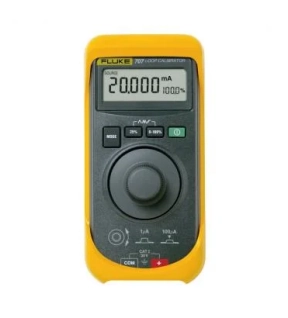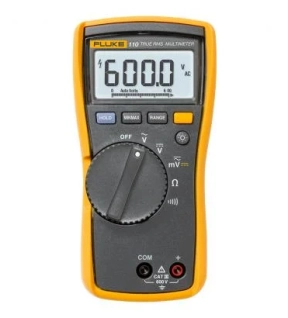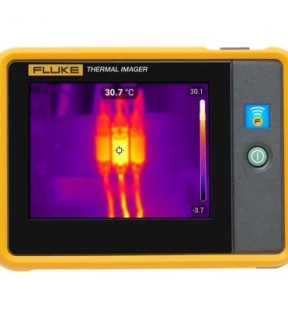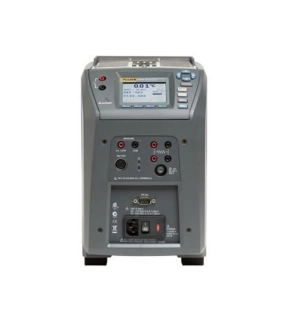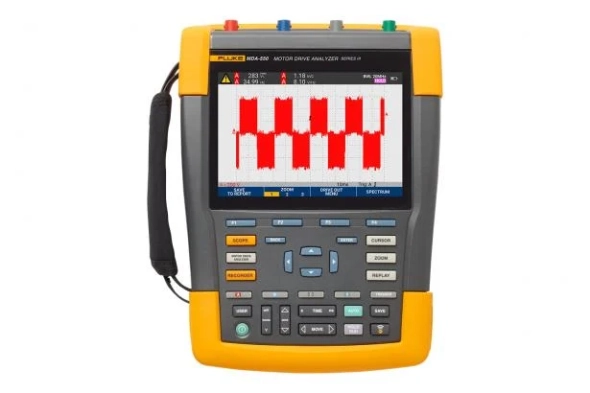
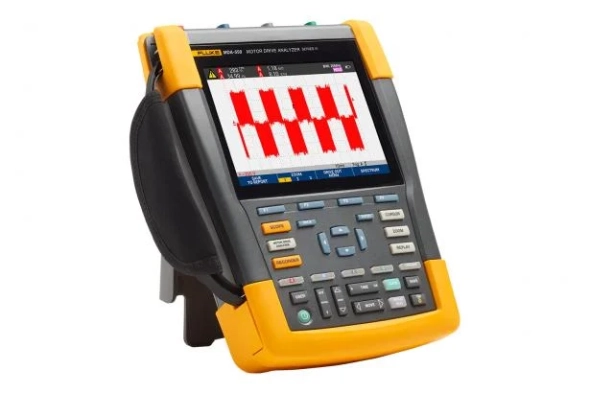
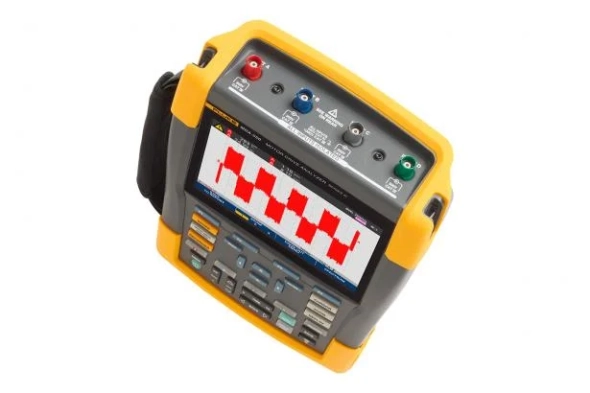
Measuring Tools
Fluke MDA-550 Series III Motor Drive Analyzer
Simplify complex motor drive troubleshooting with guided test setups and automatic drive measurement that provide reliable, repeatable test results.
The Fluke MDA 550 Motor-Drive Analyzer saves time and the hassle of setting up complex measurements, and simplifies the troubleshooting process. Simply select a step-by-step guided test and measurement will show you where to make voltage and current connections, while preset measurement profiles ensure you will get all the data you need for every critical motor drive part, from input to output, the DC bus, and the motor itself . Doing simple to complex measurements? MDA-550 can do it. What's more, making reports before (as-found) and after (as-left) repairs or adjustments becomes more practical. This is all thanks to its built-in report generator feature.
The MDA-550 is an ideal portable motor drive analysis testing tool. Not only that, this tool can also be used to safely detect and solve common problems in inverter-type motor drive systems.
- Measures main motor drive parameters , including voltage, current, DC bus voltage level and AC ripple, voltage and current unbalance and harmonics, voltage modulation, and motor shaft voltage discharge.
- Performs broader harmonic measurements to identify the impact of low and high order harmonics on your power system.
- Performs guided measurements of motor drive input, DC bus, drive output, motor input, and shaft measurements with step-by-step graphical diagrams of voltage and current connections.
- Uses simple measurement settings with preset measurement profiles to automatically trigger data collection based on the selected test procedure.
- Quickly and easily generate reports that are perfect for documenting problem solving and collaborative work with others.
- Measure additional electrical parameters with a complete 500 MHz oscilloscope, meter and logger capability for a wide range of electrical and electronic measurements in industrial systems
The Fluke MDA-550 Motor Drive Analyzer uses guided test measurements to make analysis even easier
Drive input
Quickly measure input voltage and current to see if values ??are within acceptable limits by comparing the rated voltage to the actual supply voltage. It then checks the input current to determine if the current is within its maximum rating and the conductor size is appropriate. You can also check if the harmonic distortion is within an acceptable level. There are two options for doing this: carefully examine the shape of the waveform or look at the harmonics spectrum screen which displays total harmonic distortion and individual harmonics.
Imbalance of voltage and current
Check the voltage unbalance at the input terminals so you can make sure the voltage unbalance is not too high (> 6-8%), and the phase rotation is correct. You can also check for current unbalance, as too large an imbalance can indicate a driving rectifier problem.
Wider harmonic measurement
Excess harmonics are not only a threat to your rotating machine, but also to other equipment connected to the mains power system. As well as being able to detect motor drive harmonics, the MDA-550 can also detect the potential impact of inverter switching electronics. The MDA-550 has three harmonic ranges, 1st to 51st harmonics, 1 to 9 kHz, and 9 kHz to 150 kHz providing the ability to detect harmonic pollution problems.
Bus DC
In motor drives, the conversion of AC to DC inside the drive is very important. The reason is that for the best drive performance it is necessary to have the right voltage and adequate smoothing with low ripple. High ripple voltages can be an indicator of a faulty capacitor or a faulty motor connected. The logging function can be used to dynamically check the performance of the DC bus in operating mode when load is applied.
Drive output
Check drive output focusing on voltage to frequency (V/F) ratio, and voltage modulation. If the V/F ratio is high, the motor may overheat. With a low V/F ratio, the connected motor may not be able to provide the torque required at the load to carry out the process for which it is intended.
Voltage modulation
Pulse Width Modulation signal measurements are used to check for high voltage peaks that can damage motor winding insulation. The rise time or steepness of the impulse is indicated by a dV/dt reading (value of change in voltage over time), this must be compared with the specified motor insulation. Metering can also be used to measure switching frequency. Its purpose is to detect whether there is a potential problem with the switching electronics, or with grounding, as the signal drifts up and down.
Input Motor
Ensuring the supply of voltage at the motor input terminal is important. However, choosing a connecting cable between the drive and the motor is no less important. Incorrect cable selection can cause damage to the drive and motor due to overvoltage peaks. Checking that the current at the terminals is within the motor's rating is critical because excess current can cause the motor to overheat, reducing the life of the stator insulation which can cause premature failure of the motor.
Motor shaft voltage
The voltage impulse in the variable speed drive is generated from the circuit between the motor stator and the rotor until a voltage appears on the rotor shaft. If the rotor shaft voltage exceeds the insulating capacity of the bearing grease, flashover currents (glow) may occur. As a result, pitting and fluting of the motor bearing rotation occurs, namely damage that causes the motor to fail prematurely. The MDA-550 is equipped with a carbon fiber brushed probe tip that makes it easy for you to detect destructive flashover currents. Meanwhile, the amplitude of the impulse and the number of events can be used as a consideration in taking preventive action. With the addition of these accessories and capabilities, you can spot potential faults without the need to buy expensive permanent solutions.
Step-by-step guided measurements ensure you have the data you need, when you need it
The MDA-550 is designed to help you quickly and easily test and troubleshoot common three-phase and single-phase inverter-type motor drive systems. Onscreen information and a step-by-step setup guide make it easy for you to configure the analyzer. Not only that, the information and guide will also provide the required drive measurements. That way, you can quickly make informed decisions regarding maintenance. From power input to attached motor, the MDA-550 provides measurement capabilities for the fastest motor drive solutions.
The Fluke MDA 550 Motor-Drive Analyzer saves time and the hassle of setting up complex measurements, and simplifies the troubleshooting process. Simply select a step-by-step guided test and measurement will show you where to make voltage and current connections, while preset measurement profiles ensure you will get all the data you need for every critical motor drive part, from input to output, the DC bus, and the motor itself . Doing simple to complex measurements? MDA-550 can do it. What's more, making reports before (as-found) and after (as-left) repairs or adjustments becomes more practical. This is all thanks to its built-in report generator feature.
The MDA-550 is an ideal portable motor drive analysis testing tool. Not only that, this tool can also be used to safely detect and solve common problems in inverter-type motor drive systems.
- Measures main motor drive parameters , including voltage, current, DC bus voltage level and AC ripple, voltage and current unbalance and harmonics, voltage modulation, and motor shaft voltage discharge.
- Performs broader harmonic measurements to identify the impact of low and high order harmonics on your power system.
- Performs guided measurements of motor drive input, DC bus, drive output, motor input, and shaft measurements with step-by-step graphical diagrams of voltage and current connections.
- Uses simple measurement settings with preset measurement profiles to automatically trigger data collection based on the selected test procedure.
- Quickly and easily generate reports that are perfect for documenting problem solving and collaborative work with others.
- Measure additional electrical parameters with a complete 500 MHz oscilloscope, meter and logger capability for a wide range of electrical and electronic measurements in industrial systems
The Fluke MDA-550 Motor Drive Analyzer uses guided test measurements to make analysis even easier
Drive input
Quickly measure input voltage and current to see if values ??are within acceptable limits by comparing the rated voltage to the actual supply voltage. It then checks the input current to determine if the current is within its maximum rating and the conductor size is appropriate. You can also check if the harmonic distortion is within an acceptable level. There are two options for doing this: carefully examine the shape of the waveform or look at the harmonics spectrum screen which displays total harmonic distortion and individual harmonics.
Imbalance of voltage and current
Check the voltage unbalance at the input terminals so you can make sure the voltage unbalance is not too high (> 6-8%), and the phase rotation is correct. You can also check for current unbalance, as too large an imbalance can indicate a driving rectifier problem.
Wider harmonic measurement
Excess harmonics are not only a threat to your rotating machine, but also to other equipment connected to the mains power system. As well as being able to detect motor drive harmonics, the MDA-550 can also detect the potential impact of inverter switching electronics. The MDA-550 has three harmonic ranges, 1st to 51st harmonics, 1 to 9 kHz, and 9 kHz to 150 kHz providing the ability to detect harmonic pollution problems.
Bus DC
In motor drives, the conversion of AC to DC inside the drive is very important. The reason is that for the best drive performance it is necessary to have the right voltage and adequate smoothing with low ripple. High ripple voltages can be an indicator of a faulty capacitor or a faulty motor connected. The logging function can be used to dynamically check the performance of the DC bus in operating mode when load is applied.
Drive output
Check drive output focusing on voltage to frequency (V/F) ratio, and voltage modulation. If the V/F ratio is high, the motor may overheat. With a low V/F ratio, the connected motor may not be able to provide the torque required at the load to carry out the process for which it is intended.
Voltage modulation
Pulse Width Modulation signal measurements are used to check for high voltage peaks that can damage motor winding insulation. The rise time or steepness of the impulse is indicated by a dV/dt reading (value of change in voltage over time), this must be compared with the specified motor insulation. Metering can also be used to measure switching frequency. Its purpose is to detect whether there is a potential problem with the switching electronics, or with grounding, as the signal drifts up and down.
Input Motor
Ensuring the supply of voltage at the motor input terminal is important. However, choosing a connecting cable between the drive and the motor is no less important. Incorrect cable selection can cause damage to the drive and motor due to overvoltage peaks. Checking that the current at the terminals is within the motor's rating is critical because excess current can cause the motor to overheat, reducing the life of the stator insulation which can cause premature failure of the motor.
Motor shaft voltage
The voltage impulse in the variable speed drive is generated from the circuit between the motor stator and the rotor until a voltage appears on the rotor shaft. If the rotor shaft voltage exceeds the insulating capacity of the bearing grease, flashover currents (glow) may occur. As a result, pitting and fluting of the motor bearing rotation occurs, namely damage that causes the motor to fail prematurely. The MDA-550 is equipped with a carbon fiber brushed probe tip that makes it easy for you to detect destructive flashover currents. Meanwhile, the amplitude of the impulse and the number of events can be used as a consideration in taking preventive action. With the addition of these accessories and capabilities, you can spot potential faults without the need to buy expensive permanent solutions.
Step-by-step guided measurements ensure you have the data you need, when you need it
The MDA-550 is designed to help you quickly and easily test and troubleshoot common three-phase and single-phase inverter-type motor drive systems. Onscreen information and a step-by-step setup guide make it easy for you to configure the analyzer. Not only that, the information and guide will also provide the required drive measurements. That way, you can quickly make informed decisions regarding maintenance. From power input to attached motor, the MDA-550 provides measurement capabilities for the fastest motor drive solutions.
Download
Products Lainnya
Fluke 707 Current Loop Calibrator with Quick Click Knob
Fastest one-handed handheld tool for loop inspection
The Fluke 707 title="Loop Calibrator">Loop Calibrator is a high performance solution for calibrating, repairing, and maintaining current loops. The new "Quick Click" knob makes the tool extremely fast and easy to operate. The device features:
- One-handed user interface with "Quick Click" hold knob
- Source finding, simulation, and mA measurement
- 0.015% accuracy and 0.001 mA resolution
- Simultaneous display of mA and % of range
- Selectable stages or ramp results
- 24 V loop supply with mA measurement, including 250O HART resistor
- 0-28 VDC measurement to check Loop Voltage
- Easy battery replacement without opening the box
- Simple box with separate protective case
- Three year warranty
The Fluke 707 title="Loop Calibrator">Loop Calibrator is a high performance solution for calibrating, repairing, and maintaining current loops. The new "Quick Click" knob makes the tool extremely fast and easy to operate. The device features:
- One-handed user interface with "Quick Click" hold knob
- Source finding, simulation, and mA measurement
- 0.015% accuracy and 0.001 mA resolution
- Simultaneous display of mA and % of range
- Selectable stages or ramp results
- 24 V loop supply with mA measurement, including 250O HART resistor
- 0-28 VDC measurement to check Loop Voltage
- Easy battery replacement without opening the box
- Simple box with separate protective case
- Three year warranty
Fluke 110 True-rms Digital Multimeter
Compact true-rms meter for accurate electrical installation and troubleshooting
The Fluke 110 is a versatile multimeter for electrical measurements and troubleshooting. Trusted by residential and commercial electricians for troubleshooting and maintenance. The Fluke 110 is intended for professional use where true-rms accuracy is required.
Key product capabilities
- True-rms ac voltage for accurate measurements on non-linear signals
- Great white LED backlight for working in dark areas
- Resistance and continuity
- Min./Max./Average to record signal fluctuations
- CAT III 600 V safety rating
The Fluke 110 is a versatile multimeter for electrical measurements and troubleshooting. Trusted by residential and commercial electricians for troubleshooting and maintenance. The Fluke 110 is intended for professional use where true-rms accuracy is required.
Key product capabilities
- True-rms ac voltage for accurate measurements on non-linear signals
- Great white LED backlight for working in dark areas
- Resistance and continuity
- Min./Max./Average to record signal fluctuations
- CAT III 600 V safety rating
Fluke PTi120 Pocket Thermal Imager
Portable thermal camera for industrial inspection
In the right place. At the right time. With the right tools.
The bigger the problem, the faster you have to solve it. The new pocket-sized Fluke Thermal Imager gives you the ability to minimize downtime in everyone's hands. It's the first line of defense for easy troubleshooting. Stop solving problems after they happen, start preventing them.
This tool is used because it is reliable when doing its job.
A camera that's small enough to carry around every day without worry. Always ready to use. Resistant to dirt and water. Able to survive even if it falls from a height of up to 1 meter. Now a powerful infrared probe is in your pocket for fast temperature scanning of electrical equipment, machinery and other assets.
Automatically saves your thermal images in the correct folder.
With Fluke Connect Asset Tagging, you eliminate the tedium of sorting and organizing your infrared images. Simply by scanning the QR code or asset barcode, your infrared image and all information with date and time will be saved to the specified folder. Send via Wifi or automatically upload once connected to a network or computer via USB. It's about timing. Now you can save, find, and report issues more efficiently before they become problems.
Get the infrared level you want every time.
The 3.5” LCD touch screen offers IR-Fusion™ to combine visual images with infrared images to make it easier to locate problems. Just slide your finger across the screen to adjust the settings.
In the right place. At the right time. With the right tools.
The bigger the problem, the faster you have to solve it. The new pocket-sized Fluke Thermal Imager gives you the ability to minimize downtime in everyone's hands. It's the first line of defense for easy troubleshooting. Stop solving problems after they happen, start preventing them.
This tool is used because it is reliable when doing its job.
A camera that's small enough to carry around every day without worry. Always ready to use. Resistant to dirt and water. Able to survive even if it falls from a height of up to 1 meter. Now a powerful infrared probe is in your pocket for fast temperature scanning of electrical equipment, machinery and other assets.
Automatically saves your thermal images in the correct folder.
With Fluke Connect Asset Tagging, you eliminate the tedium of sorting and organizing your infrared images. Simply by scanning the QR code or asset barcode, your infrared image and all information with date and time will be saved to the specified folder. Send via Wifi or automatically upload once connected to a network or computer via USB. It's about timing. Now you can save, find, and report issues more efficiently before they become problems.
Get the infrared level you want every time.
The 3.5” LCD touch screen offers IR-Fusion™ to combine visual images with infrared images to make it easier to locate problems. Just slide your finger across the screen to adjust the settings.
Fluke 9142 Field Metrology Well
Key features
• Lightweight, portable, and fast
• Built-in two-channel readout for PRT, RTD, thermocouple, 4-20 mA current
• True reference thermometry with accuracy to ±0.01 °C
• On-board automation and documentation
• Metrology performance in accuracy, stability, uniformity, and loading
• Lightweight, portable, and fast
• Built-in two-channel readout for PRT, RTD, thermocouple, 4-20 mA current
• True reference thermometry with accuracy to ±0.01 °C
• On-board automation and documentation
• Metrology performance in accuracy, stability, uniformity, and loading


